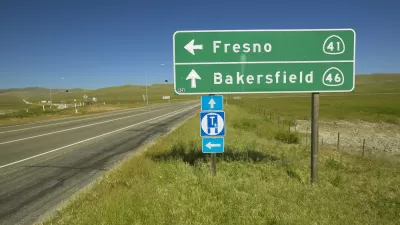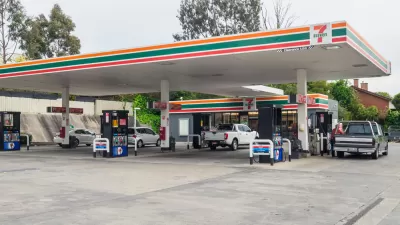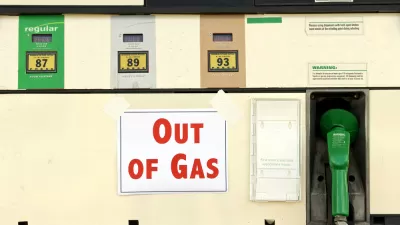Two notable transportation developments occur in California on July 1. First, a pilot road charge program begins—5,000 motorists will be charged by the mile driven. Second, the gas tax drops by 2.2 cents. An analysis by ITEP looks at both.

"Next week California will launch an experiment to determine whether the state could repeal the gas tax and instead charge motorists for each mile they drive—essentially turning every public road into a toll road," writes
The California Road Charge pilot program will last for nine months. It will be the second operating program in the United States, after OReGO (posts here) that charges motorists a small vehicle-miles-traveled (VMT) fee.
On the same day, the state gas tax decreases 2.2 cents, "the third time in as many years that the Board of Equalization has adjusted the gas tax downwards," notes our February post.
Davis states the program has merit, but he also charges the state is "ignoring the preventable decline of its gas tax." However, Planetizen has tracked the unsuccessful efforts by state Senator Jim Beall, D-San Jose, chairman of the Senate Transportation and Housing Committee and Gov. Jerry Brown to raise the gas tax anywhere from six to 12 cents per gallon, first in last year's regular legislative session, and then in a special session.
California may be a blue state, but Democrats do not hold a two-thirds majority in the legislature. As long as a two-thirds threshold is needed for the legislature to raise gas taxes and as long as House and Senate Republicans remain stalwart in their opposition to raising the gas tax, it would not seem likely that raising gas taxes will be the solution to the state's ballooning transportation deficit.
Davis recognizes that electric vehicle adoption is growing thanks to generous state incentive programs and that increased fuel efficiency since 2007 has taken a toll on gas tax collection.
"Fuel economy is down 0.4 mpg from the peak reached in August 2014, but still up 5.3 mpg since October 2007," wrote Dr. Michael Sivak, researcher for the University of Michigan Transportation Research Institute in a June 2 email accompanying a May fuel efficiency report.
"Changes in vehicle fuel economy are only part of the reason gas tax revenues are falling short," writes Davis.
In fact, when we studied the causes of the gas tax’s decline in 2013, we found that more than three-fourths of the decline since the mid-1990s was unrelated to fuel economy improvements.
An ITEP report posted here last year also showed those findings, and evaluated Oregon's road usage program as well.
Oregon’s new VMT tax is an unsustainable revenue source because it contains the same design flaw that has plagued the state’s gasoline tax for almost a century—a stagnant, fixed tax rate that is incapable of keeping pace with inflation.
Davis sent a comment much to the same effect to a California Transportation Commission committee last year.
Indexing is necessary, be it for a road charge or a gas tax
"Regardless of whether drivers are taxed per-mile or per-gallon, revenues will fall short in the long-term unless the tax rate is indexed to inflation," writes Davis. "Florida, Georgia, Maryland, Rhode Island, and Utah already index their gas tax rates, and unlike per-mile charges whose widespread implementation is still years away, inflation indexing can be implemented almost immediately."
Well, in California's case, it may take either a change to the state constitution, a change to the political party composition of the state legislature, or a change in the Republican party position on gas taxes for that to occur.
ITEP's conclusion
The experiments underway in California and Oregon are important steps toward preparing us for that future. But we don’t have the luxury of planning for the future while ignoring the needs of the present. To deal with the shortcomings that exist in our infrastructure right now, gas tax reform—not a per-mile charge—is the answer.
FULL STORY: Is Pay-Per-Mile Driven Better Than a Gas Tax? Experiment Gets Underway in California

Alabama: Trump Terminates Settlements for Black Communities Harmed By Raw Sewage
Trump deemed the landmark civil rights agreement “illegal DEI and environmental justice policy.”

Study: Maui’s Plan to Convert Vacation Rentals to Long-Term Housing Could Cause Nearly $1 Billion Economic Loss
The plan would reduce visitor accommodation by 25% resulting in 1,900 jobs lost.

Planetizen Federal Action Tracker
A weekly monitor of how Trump’s orders and actions are impacting planners and planning in America.

Waymo Gets Permission to Map SF’s Market Street
If allowed to operate on the traffic-restricted street, Waymo’s autonomous taxis would have a leg up over ride-hailing competitors — and counter the city’s efforts to grow bike and pedestrian on the thoroughfare.

Parklet Symposium Highlights the Success of Shared Spaces
Parklets got a boost during the Covid-19 pandemic, when the concept was translated to outdoor dining programs that offered restaurants a lifeline during the shutdown.

Federal Homelessness Agency Places Entire Staff on Leave
The U.S. Interagency Council on Homelessness is the only federal agency dedicated to preventing and ending homelessness.
Urban Design for Planners 1: Software Tools
This six-course series explores essential urban design concepts using open source software and equips planners with the tools they need to participate fully in the urban design process.
Planning for Universal Design
Learn the tools for implementing Universal Design in planning regulations.
Caltrans
Smith Gee Studio
Institute for Housing and Urban Development Studies (IHS)
City of Grandview
Harvard GSD Executive Education
Toledo-Lucas County Plan Commissions
Salt Lake City
NYU Wagner Graduate School of Public Service





























